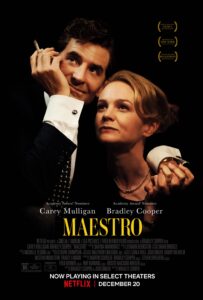Bernstein as performance: Bradley Cooper’s Maestro
If you’re up for seeing Maestro, Bradley Cooper’s much-heralded Leonard Bernstein biopic, then try to do it now, in a movie theater, before it gets remanded permanently to Netflix. The big-screen experience is worth it, for reasons I’ll get to momentarily. But let me preface this by noting that—as was the case with Todd Field’s Tár—the last place to look for cogent analysis of Maestro as a film is the throng of classical music professionals offering strong opinions about its errors and omissions. Maestro—again like Tár—is permeated by music but is not primarily about music. It’s ultimately a Hollywood love story about a historical figure, like Oppenheimer without the hearing scenes.
Maestro begins with a short prologue featuring an elderly Bernstein seated at a living-room piano. As a camera crew looks on, he plunks out sparse, bitter music that he reads from a handwritten score, before confessing how much he misses his late wife Felicia (née Felicia María Cohn Montealegre). Although not acknowledged in the dialogue, the music comes from Bernstein’s late opera A Quiet Place, a distended portrait of a dysfunctional family, including an estranged gay son whose mother has just died.
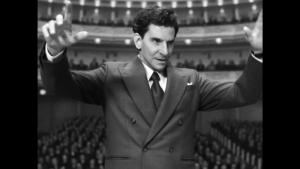
The story then commences in earnest with a flashback to 1943 and the fateful early-morning phone call informing Bernstein that his services as the New York Philharmonic’s backup conductor would be required that afternoon. The tableau is striking: a groggy Bernstein grasping a telephone in a dark room faintly illuminated by slivers of light leaking past an enormous curtain that resembles a proscenium drape but turns out to be an apartment window. When Lenny leaps out of bed, we see that it’s shared by another young man (later identified as David Oppenheim, a clarinetist who went on to head Columbia Masterworks). Lenny rushes down the hallway which transforms into the wings of Carnegie Hall, from which the nascent superstar emerges onstage for his triumphant, nationally-broadcast debut.
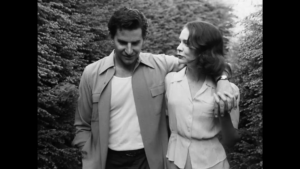
Soon we’re at the 1946 piano party where he and Felicia meet. With Lenny’s bedroom habits already revealed, the film now enlists the tension between his sexual dependence on men and his emotional dependence on women as the primary driver of the ensuing drama.1 The performative nature of the couple’s future lives is prophesied in a flirtatious vignette where Felicia—an actress by trade, who’s later shown filming Walton’s Façade for CBS—leads Lenny to an empty theater where the two sweethearts reenact a love scene from a play.
The events of the 1940s and 50s are depicted with black-and-white imagery shot in the 4:3 aspect ratio of the classic Edison rectangle. As the narrative advances through the 60s and 70s, the clothes and hairstyles change accordingly, but so does the cinematography, evolving to color and then widescreen photography by the end. The impact is greatest when seen projected in a large theater, but you can sample the effect at a more modest scale in the film’s trailer.
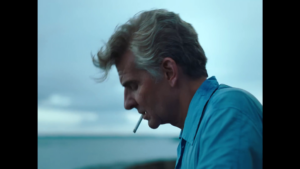
Along the way, we encounter Mahler (Cooper’s widely-seen reenactment of the 1973 Resurrection Symphony at Ely Cathedral), Lenny’s agonizing choice between a career in musical theater versus becoming “the first great American conductor”, his and Felicia’s extramarital dalliances with men, and Felicia’s death from cancer in 1978. A poignant moment comes during a period of estrangement from his family when a bearded, disheveled Lenny introduces Shostakovich’s gloomy 14th Symphony at an open rehearsal as a plea for aging artists to act and create as authentically as possible. Afterwards, we see him drinking, smoking and snorting cocaine with several men. Ironically, neither Shostakovich, trapped in the yoke of Soviet totalitarianism, nor Bernstein, trapped in the closet of sexual politics, were ever able to live their lives truly openly.
Cooper’s portrayal of Bernstein has been aptly praised: a genuine tour-de-force, the result of six years of dedicated study and practice (and up to five hours a day in makeup and prosthetic nose prep). So impeccably does Cooper capture the mannerisms of his subject that archival footage of the real maestro can be inserted over the end credits with no loss of continuity. His counterpart Carey Mulligan is less impressive, giggling too much as young Felicia while adopting a stiff actor’s English as middle-aged Felicia. But her character admittedly presents fewer opportunities for range or development. Among the other cast members, Sarah Silverman stands out as an inspired choice to play Lenny’s snarky sister Shirley.
Also noteworthy—and easier to appreciate in a theater equipped with Dolby Atmos—is the audio production skill on display here. All of Maestro‘s dialog was captured in real time during filming. Even the musical performances were recorded live, not pantomimed, as evinced by the exaggerated “conductorial” bow strokes seen from the concertmaster in the Ely Cathedral scene. It wasn’t that long ago that extensive ADR, pre- and post-recording, and Foley artistry would have been required to deliver these results.
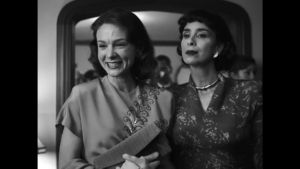
I would have appreciated more glimpses of Bernstein the craftsman. The penultimate scene, in which the widowed master critiques a conducting student’s gestures during a fermata in the first movement of Beethoven’s Eighth Symphony,2 is a rare occasion where the technique of rehearsing an orchestra is deftly depicted (Yannick Nézet-Séguin was one of Cooper’s advisors on the project). At a disco party that evening, Lenny aggressively flirts with the male student as the young crowd dances to Tears for Fears’ Shout, an allusion to the indiscretions that plagued Bernstein once he no longer had someone in his life to tell him “no”. The film mercifully declines to linger on this however, returning quickly to the scene of the suburban prologue before giving the last, silent, word to the image of a healthy Felicia, the bereft maestro’s quondam muse.
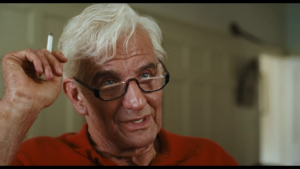
The inauspicious track record of composer biopics tempers one’s expectations for a film like Maestro, even as its craft and realism evince a quantum leap from the likes of The Music Lovers and Un grand amour de Beethoven. Beginning as it does with the quote “A work of art does not answer questions, it provokes them”, it’s perhaps disheartening that when either Lenny or Felicia asks “Any questions?” in Maestro, they’re met with silence from their audience. Aside from Amadeus—which of course isn’t a true biopic—films of this genre have had trouble captivating viewers who are not already fascinated by their subject. But in its willingness to embrace the complexity and imperfections in its central characters, Maestro succeeds better than most in conveying an insight into the dilemmas and contradictions that have burdened many a creative genius.
- Bernstein’s friend Shirley Rhoads Perle said in an interview that she felt he “required men sexually and women emotionally”. ↩︎
- “You’re ritarding into the fermata…what happens afterwards? What are you going to do? ‘cause they don’t know. You gonna bleed out of it? Are you gonna drip out of it? …Leak out of it, that’s what it sounds like…” ↩︎
